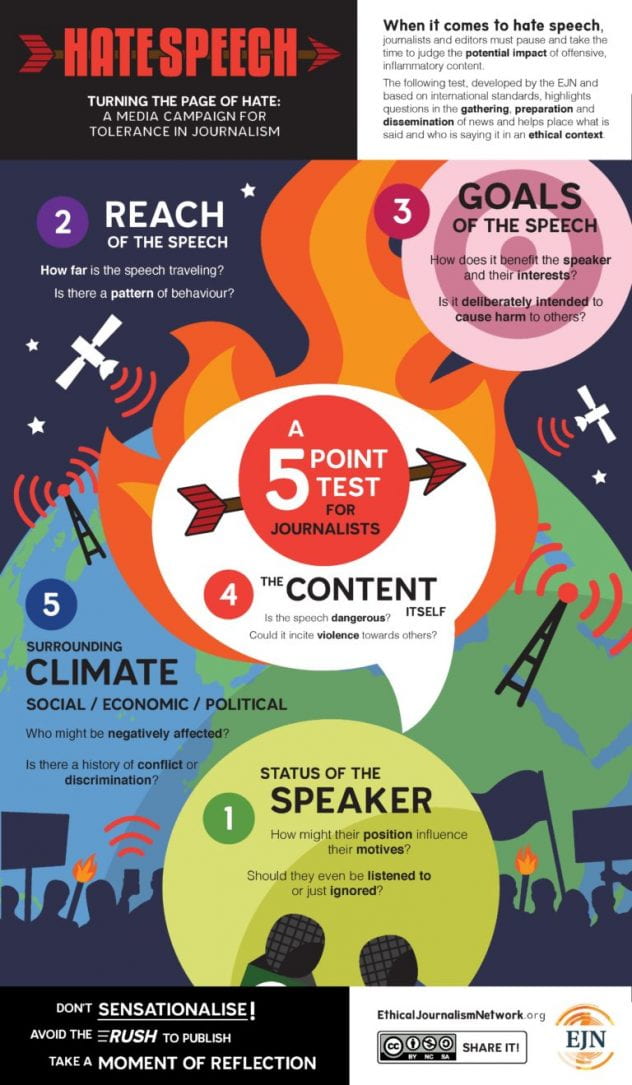With three studies published in the past couple of months, plus a range of conferences and speaking commitments, Dr. Zahera Harb has had a busy Spring term. We wanted to catch up with the Senior Lecturer in the Department of Journalism at City, University of London, to hear more about her recent work on journalism ethics and hate speech.
By Carolina Are
How do we retain trust in #journalism in a world filled with #disinformation one of the issues I spoke about in an interview with Kazakh state TV at #EAMF2019 #Almaty @EJNetwork @cityjournalism pic.twitter.com/vnRDARutGT
— Zahera Harb زاهرة حرب (@HarbZ1) May 23, 2019
Dr. Harb and the Ethical Journalism Network
Dr. Harb is a board member for the Ethical Journalism Network (EJN), a a registered UK charity and a coalition of more than 70 groups of journalists, editors, press owners and media support groups from across the globe. She contributes to EJN’s policy work, and helps set the charity’s aims and objectives:
“I joined the EJN because I work on Middle East media and politics, and wanted to bring my own area of expertise into the organisation. Now I’m going beyond that, working with journalists from other regions, and bringing my own experience as a journalist from Lebanon.”
Hate Speech Guidelines For Journalists
Working with the EJN and the Public Media Alliance (the largest global association of public broadcasters), Dr Harb recently developed guidelines for reporting on terrorism and hate speech.
The guidelines include a five-point test developed by EJN to assess whether a piece of speech or journalism constitutes hate speech. It is intended as both a guide for journalists as they develop their stories, and a tool for researchers analysing media content.
The test encourages journalists to focus on the intention of the sources they speak to: “it’s a question of whether speech aims to do others harm, particularly at moments when there is the threat of immediate violence.” The full details can be found here, and are summarised in the infographic below.

Describing this work, Dr Harb comments:
“We’re not doing regulation: we’re working together as journalists producing guidelines and action plans by journalists for journalists – not on behalf of governments. We’re doing this to understand the backstory of hate speech: the why, the how, and what do we do about it.”
Hate Speech Towards Journalists
Although the bulk of Dr. Harb’s work has focused on guidelines to help journalists avoid hate speech being produced or disseminated, it has also focused on hate speech directed at journalists, in today’s increasingly anti-establishment and anti-media political climate.
Dr. Harb says that, particularly in its guidelines for the Caribbean and the Asia Pacific region, the EJN has focused on protecting journalists from hate speech. Journalists’ integrity is under attack. She argues:
“The wave of accusations by populists, who accuse us of producing ‘fake news’, are having an impact on our work. That term has been politically used to undermine our integrity and public trust in journalism and we refuse to use it – they are lies, fabrications.
We really need to make sure we work on regaining that public trust in journalism, because it’s under attack by populist politicians. And if journalism is under attack, the ability to make a difference […] will be shaken, so we need to regain that role of watchdogs to make those in power responsible for what they do.”
But how can we do that? For Dr. Harb, now is the time to be idealistic and go back to the roots of what journalism is, an issue she recently discussed at the Eurasian Media Forum in Kazakhstan:
“We need to make sure we’re not rushing to publish; that we’re not running after revenues. We need to fact-check (which comes from cross-referencing information). We must make sure we’re not being spammed with videos and stories that have no factual basis – and being accurate and factual must come before the speed of publishing and broadcasting.
We need to stand by our core values: independence, accuracy, and increasingly with migration crises we need to be human, give voice to the voiceless and not just get sources from the powerful and ignore those who don’t have a voice and their issues.”
Here I am fussing about how it is not an existential question for journalism rather challenges to our content integrity imposed on us by digital technology among other factors including attempts to clamp down on press freedom #EAMF2019 #Almaty @EJNetwork @cityjournalism pic.twitter.com/UHiHVVIqz0
— Zahera Harb زاهرة حرب (@HarbZ1) May 23, 2019
Dr. Harb’s Research
Aside from her work with the EJN, Dr. Harb has been conducting her own research on the professional practices of journalists in the Middle East. In particular, she is looking at journalism cultures in Lebanon and Egypt. She says:
“I’m highly interested in ethics because I encountered them while working as a journalist. The title of my MA dissertation was ‘Moral Reasoning of the Lebanese Press’. I’m interested in how journalists view their practices and in their position on their ethical performance.”
This research highlights the challenges faced by Arab journalists in their daily work, an issue she discussed in a recent article for Journalism. This includes threats to financial security, with media organisations closing down; and threats to their physical safety, as many journalists are harmed or at risk for their reporting.
Another recent publication is her edited book, Reporting In The Middle East which looks at how the Middle East is reported in Western and Anglo-American media and on the stereotypes that come with that. The book includes chapters on multiple Middle Eastern countries. These chapters are united by a common theme: “Orientalism” – the exoticisation and ‘othering’ of Arab cultures – “is alive and kicking” in contemporary news reports. Media representations continue to present much of the Arab world as backward, uncivilized, and at times dangerous.




